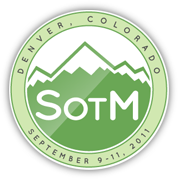Using GRASS and R for Landscape Regionalization through PAM Cluster Analysis
Landscape regionalization is a frequently encountered need in the geographical sciences, having applications ranging from sampling design to conservation prioritization. One technique for partitioning the landscape is to use cluster analysis of GIS layers describing the area under study. Here I present a GIS technique that uses partitioning around medoids as its clustering algorithm. Partitioning around medoids (PAM) is a non-hierarchical clustering algorithm that is related to the commonly-used k-means clustering technique. PAM differs from the k-means algorithm in that a) PAM assigns cluster centroids to actual data observations, rather than using values averaged over subsets of the entire dataset and b) PAM accepts categorical data as input in addition to numerical data. These properties of PAM make it useful for landscape regionalization because often one wishes to incorporate categorical variables such as vegetation class or soil types in the regionalization. I illustrate the PAM technique with several examples of sampling design for local-scale analyses of agroecosystems in Northern California. For this work I use GRASS and R, generating in GRASS a set of random points covering the study area and attributing these points with values from raster and vector layers of interest, importing this data table into R for the PAM cluster analysis, and exporting the resulting clusters back to GRASS for geographic visualization. Finally, I present work on a module using the GRASS Python scripting API to automate this process and facilitate the interaction with R in performing the PAM analyses.
Allan Hollander is a geographer and research analyst at the Information Center for the Environment at the University of California, Davis.











